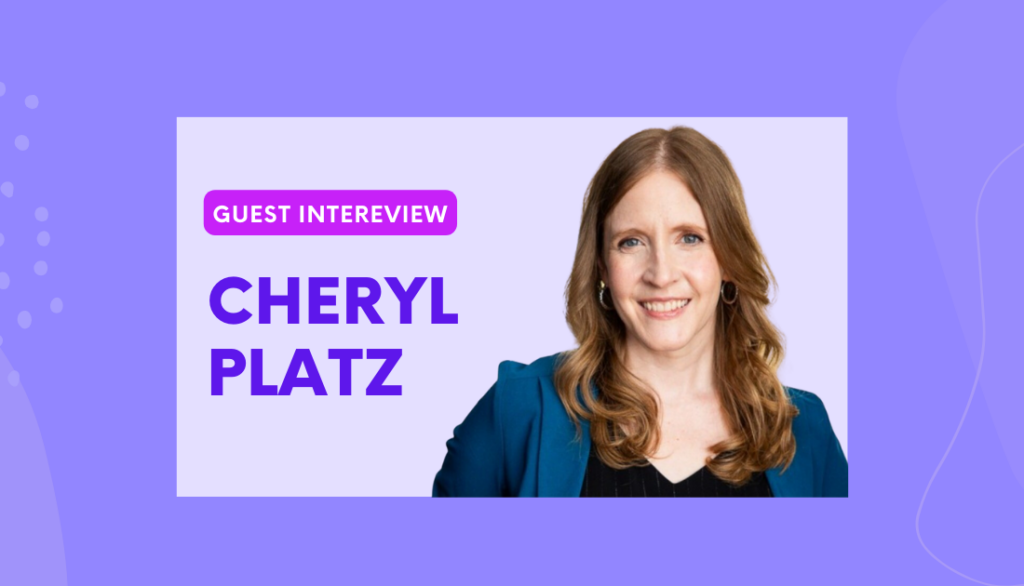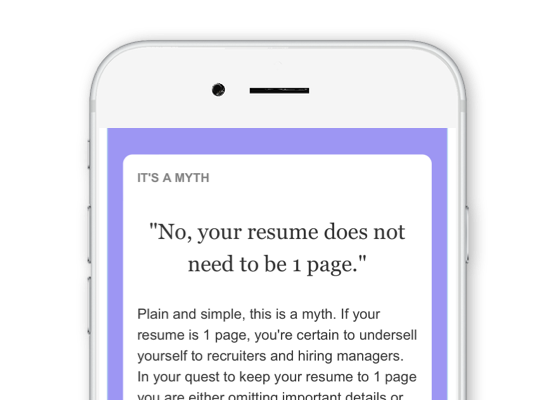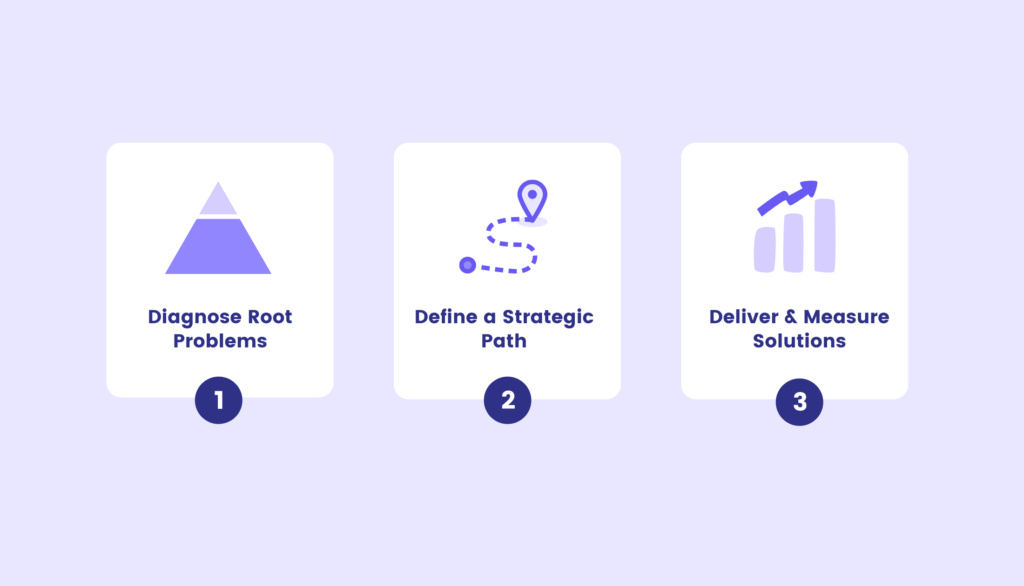Episode 67
The number 1 thing you should do before you apply for a job
8 min listen
Episode 21
8 min listen

Listen to the Episode
Episode Summary
Looking for a job can be overwhelming, but before you apply for a job, there’s one crucial thing you should do. Most candidates don’t consider what exactly they are looking for in their next role and how a job might set them up for future success in their career.
In this episode of the Career Strategy Podcast, we dive into the number one thing you need to do before applying to a job. Host Sarah shares her invaluable advice on creating your career value criteria (CVC), a list of deal breakers and nice-to-haves for your next job. By being intentional and focused on what you want and need in a job, you avoid the risk of accepting a position that doesn’t align with your values and goals.
We’ll discuss the importance of considering factors like company culture, industry, team size, and more. We’ll also consider the power of your career community in finding the right job opportunities. When you’re specific about what you’re looking for, your network becomes your eyes and ears in the job market. So, if you’re ready to level up your job search and find a position that truly fulfills you, tune in to this episode and discover how to create your career value criteria so you can avoid wasting time applying to the wrong roles.
Create your dream career, and life
- Book a free Career Strategy Call to learn how we can help you
- Get our free Career Roadmap to help you navigate your career
- Check out Career Strategy Lab, our 3-month career coaching program
Watch
Discussion Questions About The Episode
- How can creating a career value criteria help you in your job search? Reflect on the importance of being intentional and focused on what you want and need in your next job, beyond just job title and salary.
- What are some deal breakers and nice-to-haves that you would include in your career value criteria? Consider aspects such as company culture, manager and teammates, industry preferences, and company size.
- How can being specific about what you're looking for in your job search help leverage your career community? Discuss the network effect and the benefits of letting your career community know about your job search with clear criteria
- Have you ever been in a situation where you accepted a job that didn't align with your needs and wants? Share your experience and reflect on how having a career value criteria could have helped guide your decision-making.
Episode Notes & Links
This episode is part of a 5 part series about the job search, check out the other episodes in the series:
- 🔎 Ep 21: The # 1 thing to do before you apply for a job
- 👥 Ep 22: Why you should prioritize people over platforms in your job search
- 🎲 Ep 23: Why you should NOT play the numbers game in your job search
- 🕵🏻♀️ Ep 24: How to research a company before you apply
- 😞 Ep 25: How to deal with rejection in your job search
Episode Transcript
Sarah Doody [00:00:00]: Hey there. I’m Sarah Doody, host of the Career Strategy Podcast. Many professionals are seeking more impact, flexibility, growth, and let’s face it, getting paid what they’re worth. But how do you unlock this in your career? It starts with strategy. Life. I’m taking you behind the scenes of what’s working for my career coaching clients. You’ll hear strategies and yet sometimes against the grain advice for how you can be the CEO of your career and stop dreading Mondays. Ready to level up your career? Let’s get after it.
Sarah Doody [00:00:38]: Welcome back to another episode of the career strategy podcast. Less. And today, we are kicking off a series about the job search. So for the next 4 or 5 episodes, everything’s gonna be focused on various components of your job search. So today, we’ll be talking about the number one thing you need to do before you ever apply to a job. And then in the following weeks, we’ll cover topics such as why you need to prioritize people over platforms in your job search, why you should absolutely not play the numbers game in your job search, how you can research the company and its culture and its vibe before you ever even waste time applying, and then how to deal with rejection in your job search, which, let’s face it, is an inevitable part of the process. Alright. So if you have friends or family or you yourself are in the middle of a job search, this would be a great time to tell them to check out these episodes.
Sarah Doody [00:01:40]: Make sure they subscribe or follow us so they don’t miss any of these episodes over the next couple of weeks. Alright. So what is the number one thing you need to do before you apply for a job? What this is is you need to create something that I call your career value criteria or CVC as I might refer to it. Now what the heck is your career value criteria? Well, it means a list of deal breakers along with some nice to haves that relate to what you’re looking for in your next job. Love. Now we’re getting it into the details of what this means, but let’s take a step back and understand why this is so important, why it is so critical that you are very, very focused and intentional about identifying what you want in your next job, the next company you work at. Oftentimes, in their job search, a lot of people just honestly are kind of in panic mode, first of all. As a result, they’re not thinking about things like, what do I need in terms of company culture, you know, beyond job title and salary? What do I need in a manager, in teammates? What industries am I more excited to work in than others? All of these criteria that I’m describing go into, ultimately, your overall satisfaction, fulfillment, day to day joy in your job.
Sarah Doody [00:03:20]: And if you don’t think about these things, guess what? You might end up taking a job that doesn’t align with what you want and what you need, and then you might run the risk that you accept a job that shortly after accepting it, you realize, oh my god. This is not the job I thought it was. This is not the culture I wanna be a part of. This is not the type of company I wanna be at. Let It’s funny. Just the other day, one of my friends was telling me about one of her friends, and this happened to them. And my heart just went out to her because I thought, man, if she had only taken the time to identify these things, maybe she would not have accepted that job. Maybe she would not have even applied to that job to begin with.
Sarah Doody [00:04:04]: She would have had these criteria or guardrails to kind of help guide her in her job search and then kinda serve as a gut check for that ultimate decision of, do I accept this job? When people like the friend of my friend get into situations like this, it’s very easy to feel trapped. Right? A lot of people think to themselves, I only took this job 3 months ago, and now I realize I don’t like it here or it’s not setting me up for the job I wanna get 5 years from now. But they feel like, perceptually, they need to stay in that job for a minimum of 1 year because somewhere out in the universe, someone has made that a belief out there. If you leave a job before 1 year, it might look bad. Now I don’t believe in that, and that is a whole different podcast episode. Now a couple of other things to consider in terms of why you should make this, it can help you leverage one of the biggest superpowers in your job search, and that is your career community. Career community is just a word that I use rather than network because I don’t like the word network. It comes with so many assumptions and bad taste in our mouth that people are just out there to use you or get something, so I like to use the word career community.
Sarah Doody [00:05:28]: In your job search, one of the most helpful things you can do is let everyone in your career community know that you’re looking for a job. Why? Because it’s, I’m gonna say the word, network effect. It’s a network effect. What that means is if you tell 5 people that you’re looking for a job, guess what? It’s kinda like you cloned yourself, and now they are your eyes and ears for jobs out there that you might not see when you are scrolling LinkedIn or looking on Indeed. They might have friends or cousins or neighbors That do what you do and in casual conversation mention they’re hiring, and you think, wait a sec. That’s my friend. Let me introduce you. But the thing is, this can’t happen if you’re not specific with telling people what you’re looking for.
Sarah Doody [00:06:18]: So let’s take a totally different example outside of job searching. Let’s imagine you’re buying a house. You tell some of your friends in that town, hey. I wanna buy a house in town. Great. If you’re not specific about the type of house you’re interested in, guess what? Number 1, either no one is going to tell you about houses because they don’t know what you’re looking for, or 2, you are gonna end up with all these people telling you about houses that do not align with what you’re looking for. So instead of saying, hey, guys. I’m looking for a house.
Sarah Doody [00:06:55]: Let me know if anything, you know, is out there that you see and you think it might interest me. Instead, you have to be specific. And instead, you would say, hey, guys. I’m looking for a house in this neighborhood. It’s got a minimum of 3 bedrooms, 2 bathrooms. It’s a condo or a townhouse, not a real house because I don’t wanna do yard work, and should be walking distance for coffee shops and restaurants and grocery stores, something like that. Do you see how that’s a lot more specific than just, hey, guys. Let me know if you see any houses that are on the market.
Sarah Doody [00:07:31]: By being that specific, you are far more likely to have those people send you more relevant houses for your job search, and that’s gonna save you time, saves them time as well. The exact same thing applies to your job search. Right? If you just post on LinkedIn or tell your friends, hey, guys. I’m open to work. Let me know if you find something. Well, guess what? Either no one’s gonna tell you about jobs or you will receive so many irrelevant referrals to jobs that you’re just gonna be, like, spending half of your day going through all these referrals and messages in your email and LinkedIn. This is why we need to create this career value material. Now let’s get into what would go in it.
Sarah Doody [00:08:20]: Right? What things should you be thinking about? So beyond job title and salary, of course, here are the things we need to think about. We need to think about team size, company size, company industry, even things like, do you want it to be a private company, a public company, a nonprofit. Do you wanna work in government? Do you wanna work at a company that is more business to business in nature or more consumer focused? Industry. Are you really excited about health care, but you never wanna work in travel or something like that? Think about those types of things when it comes to the company. Culture is another one. Right? So when it comes to culture, You could think about things like, is the company super mission driven? Are they very scrappy in nature. Are they very buttoned up in nature? All of those things that kinda create a company culture. You could also think about opportunities for professional growth and development even as granular as how much does this company invest in their people? Do they have professional development budgets? What are those budgets? And then other things you could think about, travel.
Sarah Doody [00:09:39]: How frequently do you have to travel? Is it remote? Is it in person? Is it hybrid? All of those things make great elements of your career value criteria. Now a great, great way to brainstorm this is to think about the past jobs you’ve had, right, and think about what did you like, what did you not like about the team size about working in x y z industry, about your benefit package, about the travel you did or didn’t do. Maybe you didn’t travel and you really wish you had got to travel. As you’re thinking about what you’re looking for beyond job title and salary, reflect on your past roles and think about what lit you up and what you totally loathed and never hope to experience again in your career. Once you have your career value criteria, then it makes applying to jobs a lot easier. Because now you have some criteria you can use to filter down and be more strategic about the companies you apply to. You can also use these criteria to help you be more strategic about who you connect and engage with and try and form relationships with or spark older relationships with people in your career community. Right? Instead of letting everyone know that you’re looking for a job, maybe you only reach out to people who you know have worked at or previously worked at or currently work at companies that align with the criteria that you’ve identified.
Sarah Doody [00:11:15]: And the other really awesome thing about creating this criteria is that it gives you really strategic questions that you could ask in initial phone calls or emails with companies, in the interviews, etcetera. Because as much as they are interviewing you, you need to be interviewing them. And if you struggle to find questions to ask during interviews in the past, these criteria will give you plenty of things to ask. And anytime you have questions in the interview or in the interview process, it can help you be perceived as a more interested and engaged candidate. So if you don’t have a career value criteria or some form of that, I really encourage you to create one. It’s going to save you a lot of time. It’s gonna help your career it’s gonna help your career community help you because they’ll know what you’re looking for. They can be your eyes and your ears, will help you in your interviews, and it will ultimately help increase the chances that you end up at a job that will be fulfilling not just from a job title and salary perspective, but in all the other elements that contribute to your fulfillment, professional development, happiness, contentment in your day to day job where we all spend so many hours every single week.
Sarah Doody [00:12:45]: Alright. If you enjoyed this episode and if you found it helpful. I would love for you to share it with someone that you know, and I’d love to know too. Feel free to send me a message on social media, and let me know if you have other things that you think about when you are applying to jobs that maybe I losing income. Thanks for listening to the career strategy podcast. Make sure to follow me, Sarah Doody, on Twitter, Instagram, YouTube, or LinkedIn. If anything in today’s episode resonated with you, I’d love to hear about it. Love.
Sarah Doody [00:13:19]: Tag me on social media or send me a DM. And lastly, if you found this episode helpful, I’d really appreciate it you could share it with a friend or give us a quick rating on Spotify or review on Apple Podcasts.













